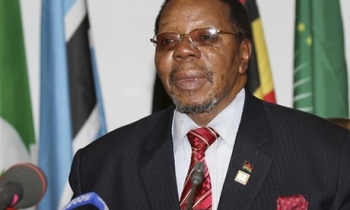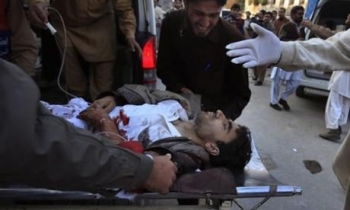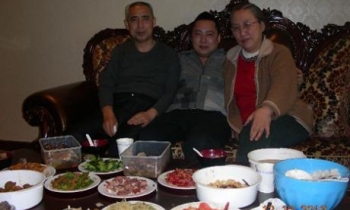The renewed fighting in Sri Lanka is taking its toll on the press too. This month alone a newspaper delivery agent was killed, a newspaper's office's searched by state security personnel, police bodyguards to an editor withdrawn, and the press virtually barred from reporting on the humanitarian crisis rising out of the conflict. There have been frantic calls to all to leave journalists alone.

The International Federation of Journalists (IFJ) has demanded an end to the continued and brutal targetting of Tamil media workers and the intimidation and censorship of Sri Lankan media. Sathasivam Baskaram, a distributor for the Tamil newspaper Uthayan was reportedly shot dead on August 15 in Jaffna while returning from marking deliveries. According to the Free Media Movement (FMM), Baskaram was delivering the paper outside of the curfew hours that have been operating in the area since August 11.
"IFJ is disgusted by the senseless killing of Baskaram, which is indicative of a disturbing trend of relentless targetting of the Tamil media. This latest murder raises further safety concerns for Tamil-language media workers in Sri Lanka, many of whom reportedly fear for their lives," said IFJ President Christopher Warren.
"Falling security and increased civil violence has lead to an increasingly dangerous environment for journalists to work in. The Tamil-language press has particularly borne the brunt of such conflict, being targetted by government, extremists and rival Tamil groups," Warren said. There is also increasing pressure on independent Sinhala and English language media to take a sectarian stand in their reporting of the conflict.
"The Sri Lankan Government and warring parties must respect the media's independence and the public's right to full, uncensored information. It is most important in times of conflict."
On the same day as Baskaram was murdered, the offices of Tamil newspaper, Sudar Oli, in Colombo were searched by army personnel. "This kind of harassment and attempt to censor Surdaroli is a grave violation of freedom of the press and is a blatant attempt to intimidate the staff of the newspaper. The continued harassment of the Tamil media in Sri Lanka must stop," said Warren.

According to the FMM and other sources, distributors of Tamil language dailies, Surdoli and Thinakkural, have been receiving death threats from anti-LTTE paramilitary groups demanding that distribution stop immediately. This has caused a number of newspaper distributors to curtail their distribution in government-controlled areas, according to local reports. There are also reports of Tamil media organisations facing "unofficial" censorship from the government.
"The intimidation and violence against the Sudar Oli press group is completely unacceptable," Reporters sans Frontières (RSF) said. "The lack of serious investigations into the murders of Tamil employees raises suspicions about the attitude of the authorities towards media that do not support the war against the Liberation Tigers of Tamil Eelam (LTTE) armed separatists. We hold the government responsible for anything that happens to the editors and staff of Sudar Oli and Uthayan".
The raid on Sudar Oli's premises in Colombo was carried out by marines and police officers. The newspaper's editor, N Vithyatharan, told RSF they checked the press cards and ID cards of his employees, especially the journalists. Those from the north of the island were questioned. The police and troops finally left after Vithyatharan stood guarantee for all his staff.

RSF has also condemned the decision by the authorities to withdraw the police bodyguards who had been assigned to Vithyatharan and managing director M Saravanabavan. At the end of a meeting on August 16 with President Mahinda Rajapakse, they asked why their police protection had been withdrawn. The president suggested they hire private bodyguards.
"We stand in solidarity with our Sri Lankan colleagues during this difficult time. These atrocities against journalists and media organisations must not be permitted to continue and the IFJ demands the Sri Lankan government put an end the violence and intimidation immediately," Warren said.
According to RSF, four Tamil newspaper employees have been killed since the start of the year. Suresh Kumar, 35, Uthayan's head of marketing, and Ranjith Kumar, 28, were shot dead in an attack on the newspaper in Jaffna on May 2. The newspaper gave the authorities the name of a leader of the Tamil paramilitary group, the Eelam People's Democratic Party (EPDP), which was suspected of carrying out the attack, but no investigation was carried out.
Newspaper vendor Mariathas Manojanraj, 23, was killed when a mine went off as he was going to collect copies of the Tamil daily Thinakkural in Jaffna last month. His relatives accused the army of setting off the mine, while some sources claimed it was the Tamil Tigers, who set off the bomb.
Since fighting broke out in the Trincomalee area, several Sri Lankan and foreign journalists have been barred from strategic towns, including Muttur, by the Sri Lankan army, which has also kept them out of rebel-controlled areas that are now inaccessible by land. The rebels have shown no interest in allowing independent journalists to report from the areas they hold and during the attack on Muttur (a mostly Muslim town) they refused access to relief workers as well.

A group of journalists, including some from BBC, were barred on August 7 from Muttur, where 17 Tamil employees of the French NGO Action contre la Faim were killed two days earlier. The government and the Tamil Tiger rebels each blamed the other for the killings.
One foreign journalist told RSF that many army roadblocks also stopped journalists from getting to places that were far from any fighting. Official passes could be obtained after a few days wait but in practice did not allow completely free movement. All journalists said the restrictions made it very hard to report on the fighting and have access to the victims. The Sri Lankan navy took journalists to Muttur from Trincomalee on August 5, the day after the rebels said they were pulling out of the town and as government troops moved in to occupy it.
"We are living in fear," one journalist said in Trincomalee. "Our job is to report but we do so at the risk of our lives. All the restrictions prevent us from talking to the war's victims."
RSF said in a statement, "We know some parts of the country have become very dangerous because of the war but the government and LTTE must not in any circumstances use this as an excuse to stop local and foreign media moving around and investigating the true situation in the east and north of the country," it said.
RSF said it would appeal to the Sri Lanka Monitoring Mission (SLMM) to provide facilities for journalists there. "Hundreds of civilians have been killed and it is vital that each side allows relief workers and journalists to work freely in these areas," it said. "We have to know what has happened in Muttur and other places."









